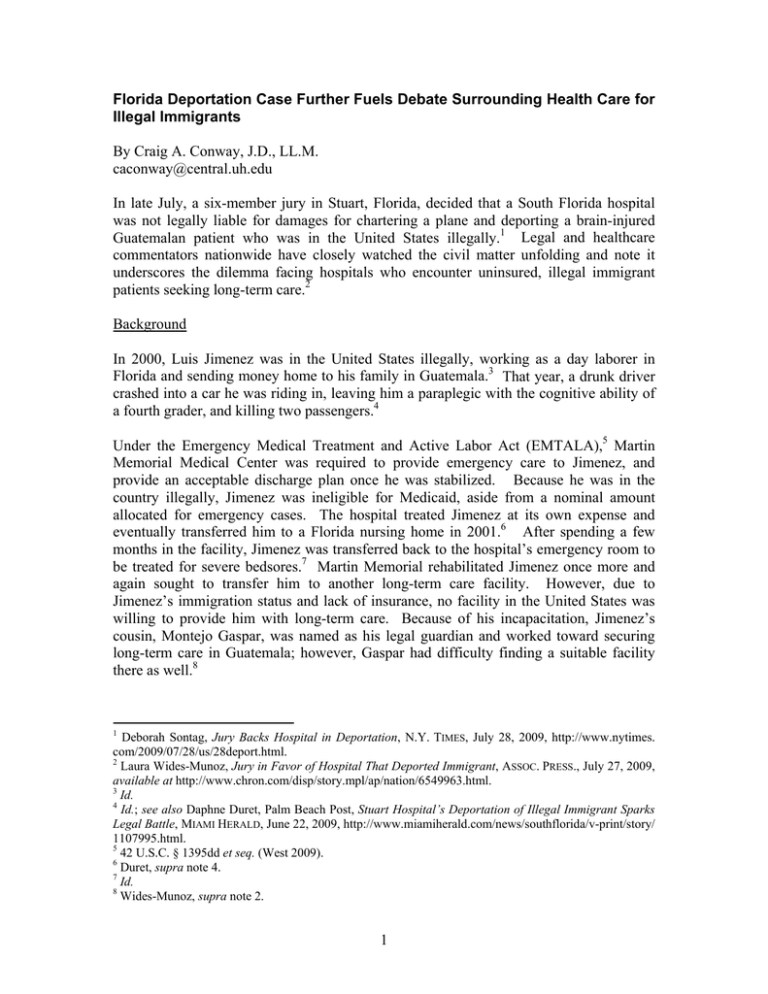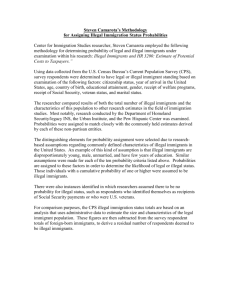By Craig A. Conway, J.D., LL.M.
advertisement

Florida Deportation Case Further Fuels Debate Surrounding Health Care for Illegal Immigrants By Craig A. Conway, J.D., LL.M. caconway@central.uh.edu In late July, a six-member jury in Stuart, Florida, decided that a South Florida hospital was not legally liable for damages for chartering a plane and deporting a brain-injured Guatemalan patient who was in the United States illegally.1 Legal and healthcare commentators nationwide have closely watched the civil matter unfolding and note it underscores the dilemma facing hospitals who encounter uninsured, illegal immigrant patients seeking long-term care.2 Background In 2000, Luis Jimenez was in the United States illegally, working as a day laborer in Florida and sending money home to his family in Guatemala.3 That year, a drunk driver crashed into a car he was riding in, leaving him a paraplegic with the cognitive ability of a fourth grader, and killing two passengers.4 Under the Emergency Medical Treatment and Active Labor Act (EMTALA),5 Martin Memorial Medical Center was required to provide emergency care to Jimenez, and provide an acceptable discharge plan once he was stabilized. Because he was in the country illegally, Jimenez was ineligible for Medicaid, aside from a nominal amount allocated for emergency cases. The hospital treated Jimenez at its own expense and eventually transferred him to a Florida nursing home in 2001.6 After spending a few months in the facility, Jimenez was transferred back to the hospital’s emergency room to be treated for severe bedsores.7 Martin Memorial rehabilitated Jimenez once more and again sought to transfer him to another long-term care facility. However, due to Jimenez’s immigration status and lack of insurance, no facility in the United States was willing to provide him with long-term care. Because of his incapacitation, Jimenez’s cousin, Montejo Gaspar, was named as his legal guardian and worked toward securing long-term care in Guatemala; however, Gaspar had difficulty finding a suitable facility there as well.8 1 Deborah Sontag, Jury Backs Hospital in Deportation, N.Y. TIMES, July 28, 2009, http://www.nytimes. com/2009/07/28/us/28deport.html. 2 Laura Wides-Munoz, Jury in Favor of Hospital That Deported Immigrant, ASSOC. PRESS., July 27, 2009, available at http://www.chron.com/disp/story.mpl/ap/nation/6549963.html. 3 Id. 4 Id.; see also Daphne Duret, Palm Beach Post, Stuart Hospital’s Deportation of Illegal Immigrant Sparks Legal Battle, MIAMI HERALD, June 22, 2009, http://www.miamiherald.com/news/southflorida/v-print/story/ 1107995.html. 5 42 U.S.C. § 1395dd et seq. (West 2009). 6 Duret, supra note 4. 7 Id. 8 Wides-Munoz, supra note 2. 1 Jimenez spent nearly three years at Martin Memorial before the facility, backed by a letter from an official with the Guatemalan government, persuaded a Florida district court judge to sign off on a transfer of Jimenez to a healthcare facility in Guatemala. Gaspar, as Jimenez’s legal guardian, appealed the judge’s order but before a final resolution was made, the hospital put Jimenez on a $30,000 charter flight home in 2003, without informing Jimenez’s family.9 Gaspar eventually won his appeal, but by then it was too late. Jimenez had been shuffled between various Guatemalan hospitals and was eventually released. He is currently living with his 73-year-old mother in a one-room home in a remote Mayan village.10 A Florida appeals court overturned the district judge’s decision allowing Jimenez to be flown out of the country, holding there was a lack of jurisdiction to make such a determination.11 Gaspar then sued the hospital seeking nearly $1 million to cover the estimated long-term healthcare costs of Jimenez’s care in Guatemala and damages for what he believed to be the hospital’s kidnapping and false imprisonment of his extremely disabled cousin.12 In late July, a jury in the civil damages case decided that Martin Memorial was not liable for false imprisonment of Jimenez and, thus, not liable for damages.13 Illegal Immigrants and the Health Care Costs In 2008, the number of illegal immigrants in the United States was estimated to be between 11.6 and 11.9 million, down from an estimated 12.7 million a year earlier.14 Of those, the illegal immigrant population is reported to be made up mostly of young families with children living in poverty and without health insurance.15 Though many experts note that the illegal immigrant population in the United States has leveled off in recent years, the number of children born to undocumented individuals rose from 2.7 million in 2003 to nearly 4 million in 2008.16 Those children are entitled to citizenship, and thus entitled access to some form of government-sponsored health care. However, the parents of those children are not. States annually spend millions on health care for illegal immigrants – with those bordering Mexico shelling out the most. A study by the United States/Mexico Border Counties Coalition found that hospitals along the border spent nearly $200 million on 9 Id. Id.; see also Sontag, supra note 1. 11 Duret, supra note 4. 12 Sontag, supra note 1. 13 Id. 14 Thomas Frank, Illegal Immigrant Population Declines, USA TODAY, Feb. 24, 2009, http://www. usatoday.com/news/nation/2009-02-23-immigration_N.htm; see also James Aalan Bernsen, Bernsen Consulting, Illegal Immigration: The Costs to Texas, 2009, http://system.gocampaign.com/files/file.asp?f= 165355. 15 N.C. Aizenman, Illegal Immigrants’ Legal Kids Snarl Policy, WASH. POST, Apr. 15, 2009, http://www. washingtonpost.com/wp-dyn/content/article/2009/04/14/AR2009041401433.html. 16 Id. (citing a research study conducted by the Washington-based Pew Hispanic Center). 10 2 emergency health care alone to undocumented immigrants in 2000.17 Total healthcare costs spent on illegal immigrants total in the multi-millions or even billions annually. In California, a state struggling to fiscally survive, some counties are cutting health services to illegal immigrants.18 In Sacramento County, two health clinics serving the poor and undocumented closed in February, saving millions in a $55 million general fund shortfall.19 In Contra Costa County, a plan has been proposed to screen out illegal immigrants – except for children and pregnant women – from nonemergency healthcare services that are provided to low-income residents unable to get insurance.20 Health Care for Illegal Immigrants in Texas Hard data and accurate statistics regarding healthcare services provided to illegal immigrants in Texas remains elusive. However, according to a report by the Texas Health and Human Services Commission, the State spends approximately $678 million annually on their health care.21 The study estimated that $597 million was spent by 94 public hospitals in the state during fiscal year 2005-2006 and the remainder, about $81 million, went to the state’s contribution to emergency Medicaid which pays for emergency medical care, including childbirth.22 Some Texas hospital districts record amounts spent on “uncompensated” care, but often fail to specifically account for the money spent on illegal immigrant care. For example, the Harris County Hospital District, serving Houston and surrounding areas, spent nearly $203.5 million in uncompensated care.23 Parkland Hospital spent $478 million on uncompensated care in 2006 and $512 million in 2007.24 Additionally, poor statistics fail to provide a true picture of the immigrant population in Texas. In the 2000 Census, the U.S. Census Department estimated that the overall percentage of illegal immigrants in the United States who live in the state to be around 17 U.S./Mexico Border Counties Coalition, Medical Emergency: Costs of Uncompensated Care in Southwest Border Counties, (Sept. 2002), available at http://www.bordercounties.org/vertical/Sites /%7BB4A0F1FF-7823-4C95-8D7A-F5E400063C73%7D/uploads/%7BFAC57FA3-B310-4418-B2E7-B68 A89976DC1%7D.PDF (The study found that California spent $79 million; Texas spent $74 million; Arizona spent $31 million; and New Mexico spent $6 million); see also John David Powell, Healthcare Debate Must Include Costs for Treating Illegals, POST CHRON., July 27, 2009, http://www.post chronicle.com/commentary/article_212247009.shtml 18 Daniel B. Wood, In Hard Times, Illegal Immigrants Lose Healthcare, CHRISTIAN SCIENCE MONITOR, Mar. 24, 2009, http://www.csmonitor.com/2009/0324/p01s01-usec.htm. 19 Id.; see also Anna Gorman, California Counties Cut Healthcare to Illegal Immigrants, L.A. TIMES, Apr. 27, 2009, http://articles.latimes.com/2009/apr/27/local/me-immighealth27. 20 Id. 21 Andrew Chavez, Texas Taxpayers Spent $678 Million on Healthcare for Illegal Immigrants, FREE REPUB., Dec. 13, 2008, http://www.freerepublic.com/focus/news/2148314/posts. 22 Id. 23 Id.; see also Powell, supra note 17. 24 Bernsen, supra note 14 at *8. 3 14.8 percent.25 That results in an estimated 1.7 to 1.9 million illegal immigrants living in Texas.26 These estimated immigrant population numbers and healthcare costs are precisely that – estimates. True figures and amounts will continue to be elusive as long as state agencies fail to collect the hard data. That may be a risky plan with national lawmakers mulling over health care reform proposals, including one that would extend Medicaid to nearly 1 million Texas adults – a massive jump from the approximate 38,000 who currently qualify.27 Conclusion Presently, Martin Memorial Medical Center in Florida is treating another illegal immigrant from Mexico with severe brain damage. The facility has spent nearly $1.5 million over the last two years on his care and has contacted the United States and Mexican governments for assistance in returning the man to Mexico, without any response. Recently, President Obama was asked whether illegal immigrants should be covered under a new health care plan.28 His response was “no” with a possible exception to be made for children.29 Unless some reforms are made to the current healthcare system specifically addressing illegal immigrants, including Medicare and Medicaid, it is likely that states and private providers will continue to spend millions on their care. Health Law Perspectives (August 2009) Health Law & Policy Institute University of Houston Law Center http://www.law.uh.edu/healthlaw/perspectives/homepage.asp 25 Id. at *2. Id. at *2-3. 27 Dave Michaels, Texas Medicaid Program Likely to Surge Under Health Care Proposals, DALLAS MORN. NEWS, July 24, 2009, http://www.dallasnews.com/sharedcontent/dws/dn/latestnews/stories/072409dnbus medicaid.3fc4927.html. 28 Brian Montopoli, Obama: No Health Care For Illegal Immigrants, CBS NEWS, July 21, 2009, available at http://www.cbsnews.com/blogs/2009/07/21/politics/politicalhotsheet/entry5178652.shtml. 29 Id. 26 4




